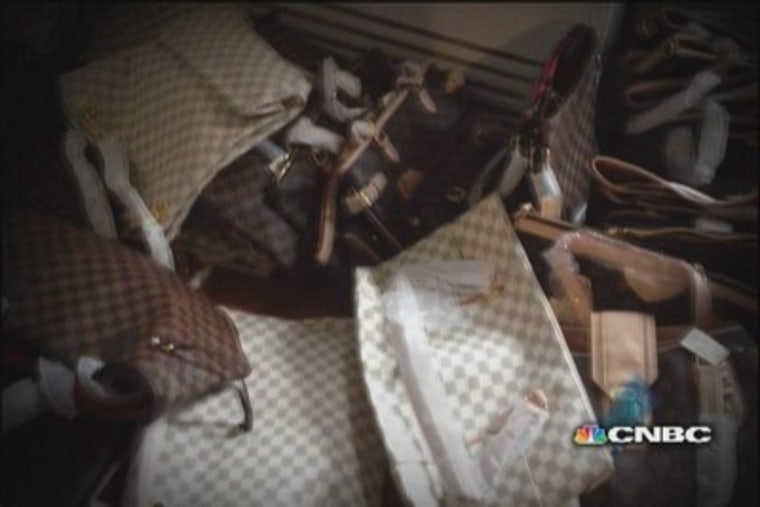"You're never alone. There are a hundred eyes on the street. They're working with teams of people. They're on bicycles. They're on rooftops."
It was an ominous message from Bill Ryan, a private investigator who works for high-end handbag designers to ferret out the gangs that sell fake merchandise in a bustling, global underground market. Ryan agreed to take us undercover into New York City's Chinatown district, where knock-off Chanel, Louis Vuitton, Coach, Tory Burch and Prada bags are sold by the thousands.
Vendors in New York City once sold fake bags on the sidewalk, but a recent crackdown by law enforcement has forced them to adapt, moving their business off the streets and into apartment buildings.
This is huge business in New York and around the globe. According to the Department of Homeland Security, 500 million fake handbags, belts and wallets worth $1 billion on the street were confiscated last year. New York University Professor Thomai Serdari says companies spend millions trying to stop the counterfeit rings and has a message for people who don't think twice about buying a fake Chanel, Prada, Gucci or Tory Burch: "There's usually child labor involved. There could be funding of a terrorist organization."
(Watch: Crime & Punishment: $21 million fraud)
Our crew got wired up with hidden cameras and met Ryan's undercover investigators, who set up a meeting with Judy, their contact in Chinatown. She is a fast-talking, fast-moving woman who hustles customers on the street, ushering tourists who want to spend $100 for a fake bag rather than $1,500 for the real thing into hidden showrooms and apartments. Ryan's investigator told Judy that we were relatives up from Miami looking for purses.
Judy walked us up four flights to a dingy apartment on Canal Street that was filled with counterfeit merchandise. Piles of purses, belts and wallets were everywhere—on the kitchen counter, in the sinks and bathtub and on top of the oven. They told us to be quiet and pressured us to make our purchase and leave as quickly as possible.
We spent several hundred dollars on Chanel and Gucci bags that looked pretty close to the real thing. Before they would let us walk out of the building, they made sure their spotters didn't see any police officers on the street.
In the second location we visited, the sales approach was more high-tech. The saleswoman showed us images of handbags on a laptop computer and after we chose the one we wanted, she made a call and a few minutes later, it was delivered to us. It's clearly a well-organized enterprise.
Jeff Pohlman is a senior producer at CNBC. Andrea Day is a reporter at CNBC, covering crime and punishment.
